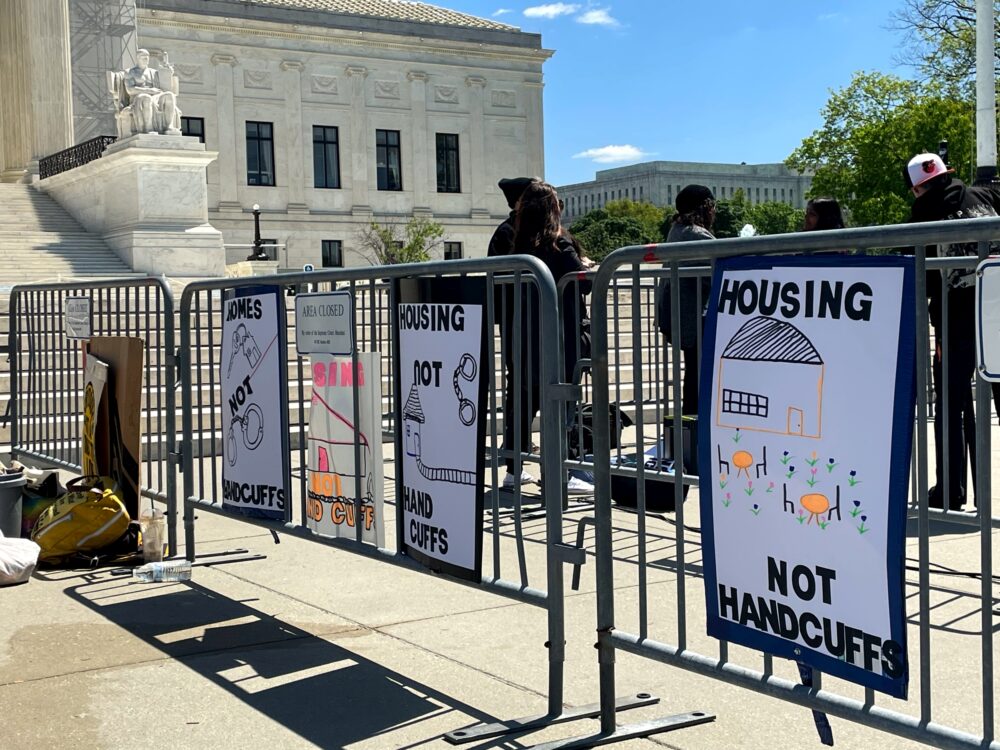WASHINGTON — In what advocates call the most important case on homelessness in 40 years, the Supreme Court must decide whether cities can punish the unhoused for sleeping in public when they have nowhere else to go.
The case comes from the small Oregon city of Grants Pass, which prohibits sleeping in public with so much as a blanket. After three homeless people filed a complaint, courts have blocked the city from enforcing the rule.
Grants Pass, supported by dozens of other cities and states, wants the Supreme Court to overturn a decision by the Ninth Circuit Court of Appeals, which ruled that punishing homeless people for sleeping outside when they have nowhere else to go violates the Eighth Amendment’s ban on cruel and unusual punishment.
Theane Evangelis, the lawyer representing Grants Pass, told the justices in oral arguments Monday that the city needs to protect its public spaces, but the lower court’s ruling has tied its hands to address public health and safety.
If the Supreme Court affirms the decision, the city will have to “surrender public space” while local shelter beds go unused, she said.
Justices Sonia Sotomayor, Elena Kagan and Ketanji Brown Jackson, who make up the liberal minority, appeared to strongly oppose the city’s fines for homeless people sleeping on public property.
Evangelis argued that the camping ban, which includes setting down a blanket to sleep, applied to everyone. Sotomayor rejected that claim, citing the testimony of the Grants Pass police officers, saying they hadn’t ticketed anyone who wasn’t homeless.
Much of the discussion revolved around whether sleeping in public is an inextricable part of being homeless or a behavior that can be outlawed.
Evangelis insisted that “sleeping outside is considered conduct.”
“You could say breathing is conduct too, but presumably, you would not think it’s okay to criminalize breathing in public,” Kagan replied.
Sotomayor asked what would happen if all cities and states passed laws like the city’s public sleeping ban.
“Where are (homeless people) supposed so sleep? Are they supposed to kill themselves (by) not sleeping?” Sotomayor said.
If sleeping is protected from fines because it is a biological necessity, the ruling could have broader implications, parties siding with Grants Pass argue.
“Its next logical application is urination and defecation, which are ‘biologically compelled’ no less than sleep is,” said a brief signed by 24 states that was filed with the high court.
Chief Justice John Roberts wanted to know if someone suffering from hunger could be prosecuted for stealing food.
Justice Neil Gorsuch expanded that argument and asked if public urination and defecation would be protected if there were no public bathrooms.
Kelsi Corkran, who represented the homeless people of Grants Pass, argued that stealing food or urinating in public are not inextricably linked to the state of being homeless, but sleeping outside is.
She pointed out that cities can still punish homeless people for refusing to go to a shelter if a space is available to them.
All justices seemed to agree that fines and imprisonment will not solve the homelessness crisis.
“When you get out of jail… what’s going to happen then?” Justice Brett Kavanaugh asked. “You still don’t have a bed available. So how does this help?”
Nevertheless, the conservative majority seemed skeptical of blocking city laws that deal with homelessness.
Maryland is among six states in the case that is supporting the Grants Pass people experiencing homelessness. A brief filed by Attorney General Anthony Brown states that policies criminalizing sleeping in public “just move the problem elsewhere” and might even increase homelessness by imposing debts through fines and creating criminal records.
Maryland is outside the Ninth Circuit Court’s jurisdiction. But if the Supreme Court sides with the homeless residents of Grants Pass, Maryland cities would be blocked from punishing homeless people for sleeping outside when they have nowhere else to go.
At least one Maryland city has such a law on the books. The city of Frederick’s ordinances prohibit laying down bedding and sleeping in public. A violation of these rules is punishable by a fine of up to $1,000 or six months in jail.
It is unclear whether the city enforces the law. The communications department didn’t return multiple emails and calls asking about enforcement.
The nation has seen unprecedented levels of people living and sleeping outside. Unsheltered homelessness affected over 250,000 people on any given night in 2023, according to the federal Department of Housing and Urban Development.
“Criminalizing people is ineffective. Arresting people makes it worse and is a really expensive way to not solve homelessness,” said Sarae Lewis, who is the principal of communications and campaigns at the non-profit Community Solutions, which works with over 100 cities nationwide to reduce homelessness.
The Supreme Court is expected to issue a decision by the end of June.

